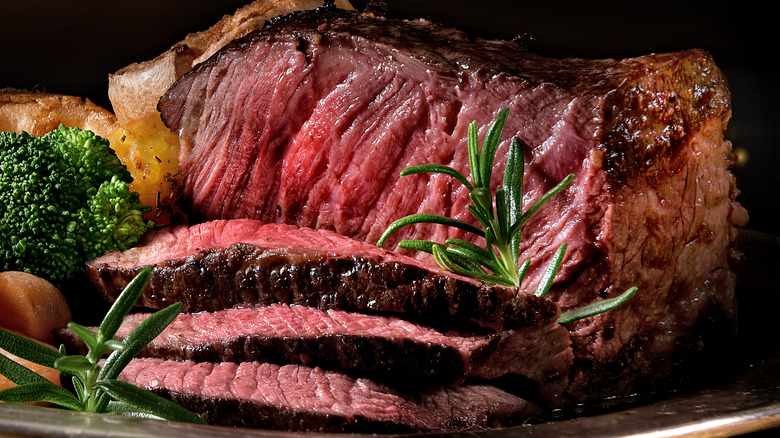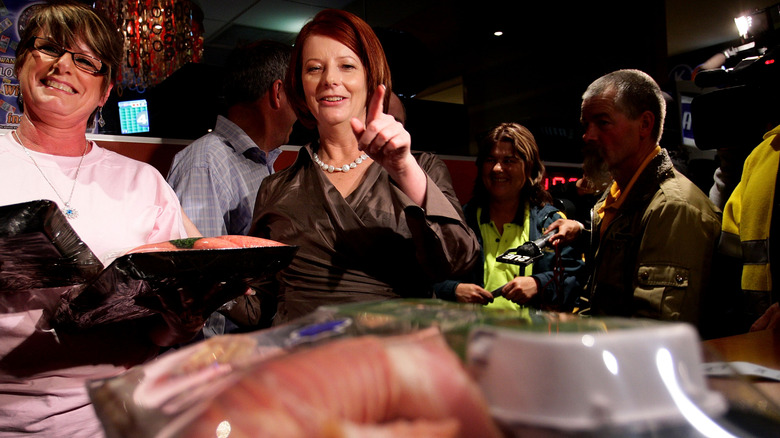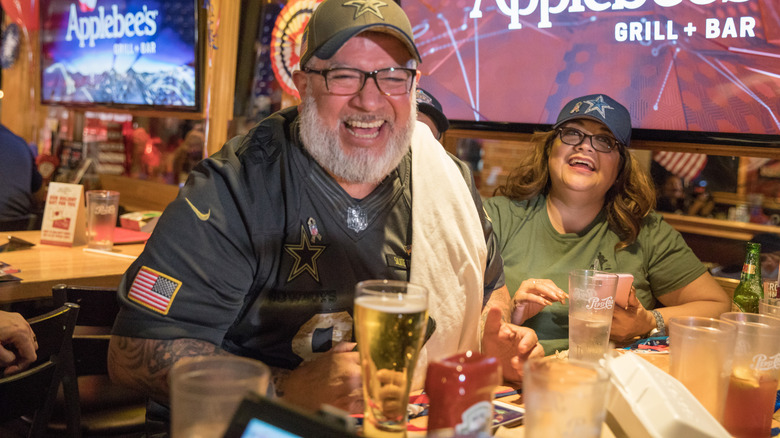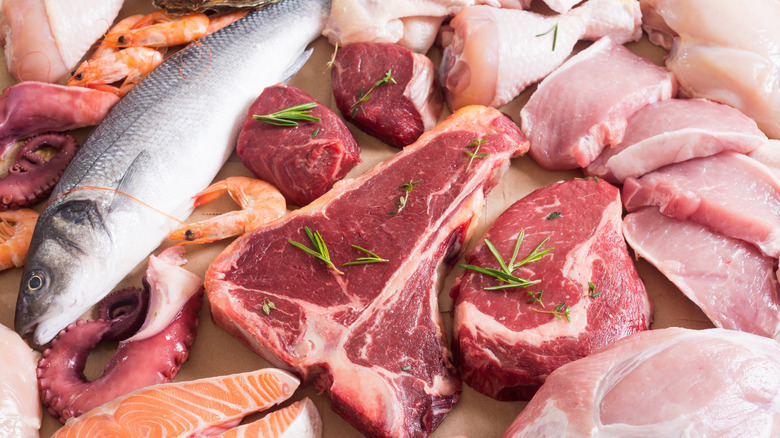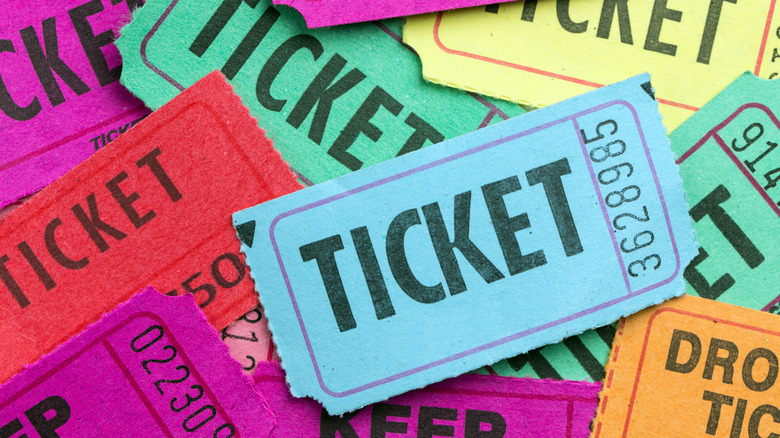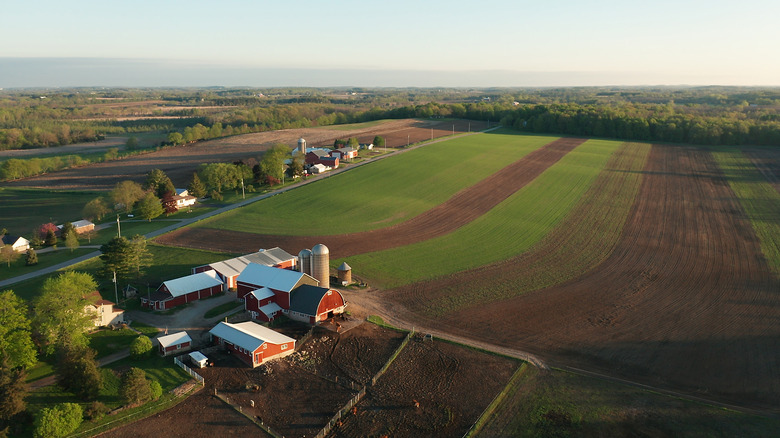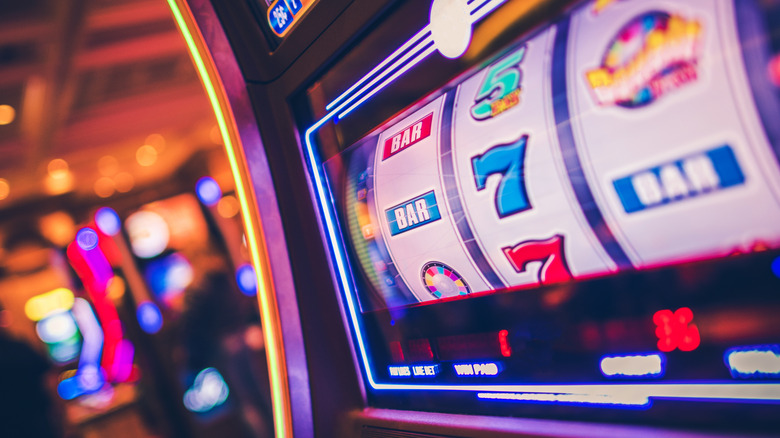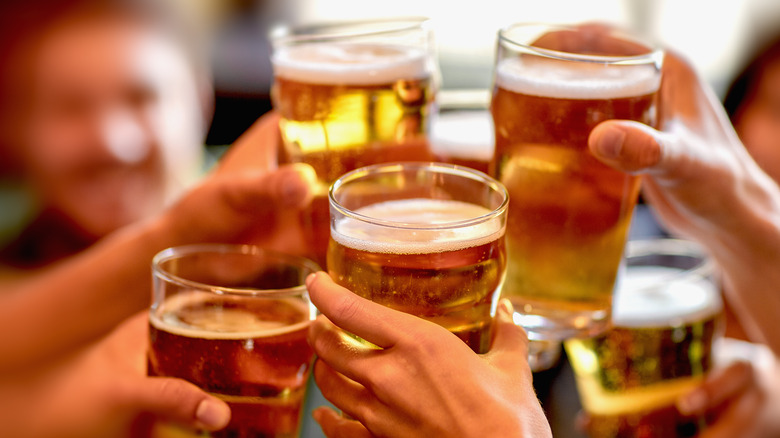The Untold Truth Of Meat Raffles
Meat raffles: the underrated phenomenon sweeping the nation. From the halls of rural veterans' clubs to trendy new bars, they are an increasingly popular activity for people of all ages (via the Star Tribune). Per Atlas Obscura, although meat raffles are most commonly held in cities and small towns in New York, Minnesota, and Wisconsin, word is beginning to spread of this fun community activity.
To participate in a meat raffle, all you need is a few bucks and a love of all kinds of meat. When you arrive at the venue, we recommend grabbing a beer and sitting back to enjoy a once-in-a-lifetime experience (you know, until you return for the next one).
With the spin of a giant wheel, you could become the winner of select cuts of meat from local butchers. As Taste writes, meat raffles have all kinds of meat, from burgers to pork chops, and most of it is given to winners for the price of a $1 ticket. Regardless of the prizes you win, the experience is sure to be one to remember.
They originated in England before becoming popular in the US
Though the history of meat raffles isn't meticulously documented, most agree that they began in the U.K. before becoming popular in the United States. According to By the Seat of My Skirt, meat raffles began as a response to food rationing during World War II. Families would donate whatever meats they had to the auction and cross their fingers, hoping they'd be the lucky winners of more goodies than they gave up.
The meat raffle became more than just an opportunity to bring home some bacon — it quickly transformed into an event that brought communities together. Meat raffles gather families and friends for drinks, conversation, and prizes. They also are used to raise funds for schools and other charitable organizations (via Meatraffles.com). The Star Tribune writes that meat raffles showed up in rural Minnesota shortly after WWII, and that they're part of the state's tradition of charitable gambling.
They're popular among older generations
When meat raffles started becoming popular in the U.S., they existed mainly among older generations, in veterans' groups or American Legion clubs (via Atlas Obscura). For many years, meat raffles were something of a trade secret in these circles. "You'd have a lot of older guys that knew about it. You wouldn't get some 22-year-old at the meat raffle, you'd get his father, his grandfather," Nuni Castaneda, a bartender in Milwaukee, Wisconsin, told Atlas Obscura. When younger people do show up to meat raffles, it's usually based on intel from an existing, older participant. "You almost have to be told about it by someone who's older."
However young people are hearing about meat raffles, they're starting to show up to them more and more. In Buffalo, New York, where meat raffles have been popular for years among a mostly elderly crowd, the average age of participants has dropped to 40. While they have historically taken place in American Legion halls, they are spreading out to bars and restaurants where the public can watch the raffle with envy (and sign up for the next one).
You can win all kinds of different meat
The meats available at these raffles vary widely. According to Taste, some meat raffles try to coordinate their meat options based on the season. Spring and summer bring grillable cuts — burgers, hot dogs, etc. — while fall raffles feature heartier items like turkey and ham. The raffles will often plan for the holidays, which allows lower-income families to win big cuts of meat they might not otherwise be able to afford.
For the most part, when you arrive at a meat raffle, you have no idea what you'll leave with (if anything, for the unluckiest of the bunch). As the Buffalo News explains, the meat prizes can range in size and shape; winners can walk away with all kinds of meat, like chicken, beef, pork, or sausage. You might get lucky and find yourself taking home prime cuts, like sirloin or ribs — all for just the price of a $1 ticket.
Tickets typically cost $1 or less
Depending on the meat raffle, tickets to win meat are cheap — that's what makes it so fun! Typically, there will be a cost to attend the event in addition to the cost per ticket, which allows you to bid on certain cuts of meat. Admission tickets generally cost between $5 and $10, which buys you a seat, snacks, and, depending on the raffle, all-you-can-drink beer and wine (via the Buffalo News).
When the bidding starts, participants can pick and choose which meats to bid on. They wave dollar bills in the air to signal that they want to buy a ticket and cross their fingers that the matching number is drawn. It's typical for tickets to cost $1, but buying a ticket doesn't guarantee you'll walk away with a prize. In fact, if luck isn't on your side, you can easily blow $50 on tickets and still leave empty-handed.
They often support struggling business and good causes
Though meat raffles offer participants a fun evening among friends, they provide even more to the communities they take place in. Often, communities hold meat raffles to support a local charity or nonprofit, and the event can draw crowds for struggling small businesses. As the Los Angeles Times explains, meat raffles are essential for bars and restaurants in small towns where unemployment rates are high and seasonal tourism drives much of the economy.
While the hosts benefit from participants purchasing beer and food, the proceeds from the raffle itself often go to charity. David Schwartz, director of the Center for Gaming Research at the University of Nevada, Las Vegas, told the Star Tribune that charitable gambling in America started sometime in the 1920s. It originated as a way to take advantage of people's desire to gamble by using the proceeds for productive causes. So, while meat raffles are often raucous events loud with the cries of both winners and losers, they also offer support to those that need it.
They're especially popular in Minnesota, Wisconsin, and Western New York
If you've never heard of a meat raffle, you probably don't live in rural Minnesota, Wisconsin, or Western New York. They've taken off in these states in recent years, becoming popular community events for people of all ages (via Atlas Obscura).
The Los Angeles Times asked a handful of Minnesotans what drew them to meat raffles, and many cited their rural upbringings and love of meat. "We're rednecks," said Deb Tulenchik, a bar manager. "For us, meat makes the world go round."
Rick Hruby, a bar manager based in Minneapolis, told Atlas Obscura that over the years, meat raffles had become increasingly popular in his area. "It's kind of a trendy thing that's going on right now over here," he said. As they continue to gain recognition, perhaps meat raffles will proliferate to bigger cities and wider audiences across the country. One can only hope!
It's technically gambling
The best meat raffles are performed using a giant spinning wheel, à la "Wheel of Fortune." The attendee with the ticket number that matches that on which the wheel lands gets the winning meat; as the Star Tribune points out, the meat raffle tradition pairs two of Minnesotans' favorite things: meat and gambling.
"Gambling is an ingrained part of the culture in Minnesota," Gary Danger, an employee at the Gambling Control Board, told Star Tribune.
Charitable gambling, which was legalized in Minnesota in 1945, did not initially include raffles in its definition. In the 1980s, raffle-based gambling became legal, so long as the proceeds were directed to charity. According to Star Tribune, charitable raffles as a whole became less popular during the Great Recession — with the exception of meat raffles, which grew in popularity even during those tough times.
Meat raffles fall under a "paddle wheel" category in technical terms — a type of gambling that received about $32 million from Minnesotans in 2014, of which about $10 million went to charity.
They bring communities together
The main purpose of a meat raffle is, of course, to take home some cheap meat. But the ancillary benefits of these events — especially the sense of community within the four walls of the raffle venue — attract crowds as well.
"Being able to spend time with friends and family, having a few bowls of loud-mouth soup (beer), scratching the gambling itch, providing money to a cause are all terrific things about attending a raffle," Erick Hansen told Atlas Obscura.
By gathering together to drink, talk, and possibly win a few pounds of quality meat, meat raffles offer a community-oriented activity that brings people of all ages and backgrounds together for a fun night. Since most of the meats come from local butchers, according to NPR, and the raffle profits are directed to charities, participants are able to not only support their neighborhoods and cities, but also connect directly with their rowdy, raffling neighbors. "Everybody leaves with a smile on their face," Ed Nabozny told NPR.
You can win additional prizes, too
Scoring big at a meat raffle usually means coming home with an armful of quality meats, but sometimes the other prizes are even better than winning that coveted rack of ribs. Taste writes that at a raffle in West Seneca, New York, aside from the hundreds of pounds of meat that went to happy gamblers one night, there were also big door prizes such as golf clubs, a television, and a grill.
With a meat raffle, like most gambling, you never quite know what you're going to get. You could come home with anything from hot dogs to filet mignon, a new television, or nothing at all. Although the promise of meat is what gets people in the door, the real prize of a meat raffle is time well-spent with good company. Hopefully, the knowledge that their ticket money will go to a good cause will be enough to satisfy even the unluckiest raffle participants.
